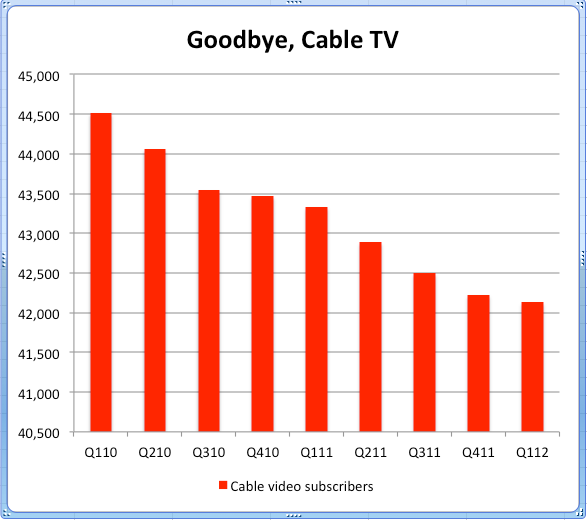 I just read an absolutely fascinating article from the financial world about how the television business is having a dismal year and the future looks bad.
I just read an absolutely fascinating article from the financial world about how the television business is having a dismal year and the future looks bad.
The reason I found the article fascinating is that it completely agrees with everything I’ve been saying about those who make content and those who deliver it to the consumers. Here’s a hint for anyone that wants to be my friend, just tell me I’m amazingly smart and always right!
Massive ego aside, I did want to take a quick look at what the metrics from this article mean about our future consumption of content. What I think is happening is that there is a growing separation between those who create content and the companies that distribute it to us. In the past these two industries were often combined. The networks, studios, publishers, and labels created the content and delivered it to us.
With wireless internet becoming more universally available and with devices that can take advantage of that medium becoming almost ubiquitous we are seeing a trend where people consume content when they want and where the want. That content is no longer tied to a provider.
I’ve been hammering away for years that the major content creators should simply give up on delivering content. They should give their content away for free to the providers and get revenue each time someone consumes content.
Naturally there has been reluctance to accept this business model. The content creators had huge revenue streams through their delivery arms.
What is happening now is that people don’t want to pay for access and subscribers are falling. They want to pay for individual items they purchase. We don’t pay to have access to the grocery store, we pay for the items we buy. As times goes on fewer and fewer people will have dedicated television or internet devices. All media will be delivered electronically to whatever device we are viewing at that moment. We will pay for this by watching advertisements and possibly some monthly fee. Advertisers will pay the content providers a certain amount per view. The content providers will then pass along a share to the content creators.
As it stands, when I see my favorite shows being pulled from Hulu, my favorite sporting events being pulled from ESPN3 I get angry. However, I see a bright future for me and others who enjoy content. No longer will we be tied to a service. I will watch what I want, when I want. Those that provide popular content to the largest audience will get the lion’s share of the revenue.
The content creators will open their vast libraries to Hulu, Netflix, ESPN3, and other providers that will arise in the future.
New content creators will arise, regular people who write their own amazing Sword and Sorcery fantasy novels for example! People will consume what we want at a reasonable price.
There will be more success stories like Felicia Day. Regular people will be able to showcase their talents directly. More content, more creativity, more variety, more goodness!
Children will dance in the streets. Dogs and cats will live in harmony. The Cardinals will win the World Series every year (darn you and your beards; evil Red Sox).
Tom Liberman
Sword and Sorcery fantasy with a Libertarian Ideology
Current Release: The Spear of the Hunt
Next Release: The Broken Throne
So the problem with adopting a pay as we go model is the absolutely rigid entertainment industry that grasps at every possible avenue to hang on to their dead business model. They are the only industry (especially record labels and the RIAA) who simply do business as if their very customers are the enemy.
Why change when congress is willing to listen to a few generous lobbyists and keep on outlawing technology the industry didn’t invent, but is bound and determined to control?
Thank you for the comment!
Reading between the lines I detect a hint of unhappiness with the RIAA and others in the industry over the pace of their willingness to understand and adopt a new business model. 🙂
I agree!
Come back any time,
Tom